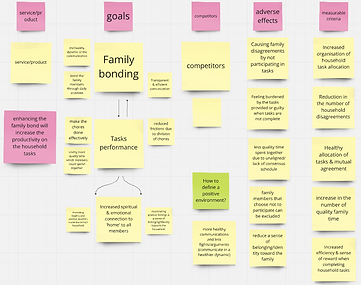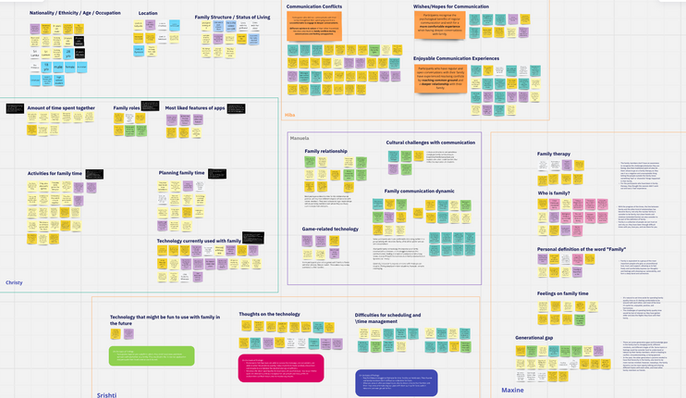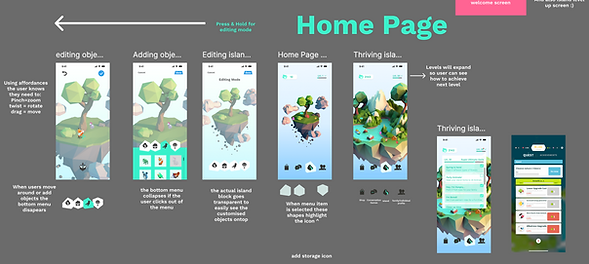How to apply Lean Innovation to MVP?
My Contributions
Designing iteratively from wireframe sketches to high-fi prototype
5 sprints as cycles of build-measure-learn to create the outcome
Being a presenter and a critiquer in design critiques
loop the audience into our product to gain feedback to gain new idea to constantly improve and give constructive feedback to others
Conducting lab study (inc. personaes, usability tests, interviews, and affinity diagram)
understand the needs and challenges of target users to meet the user outcomes





Iterative Design Process
Problem Definition
Learn about those who need to improve their quality of life at home
Research with empathy to define demographic (individual)
Propose to the group and brainstorming (individual + group)
Narrow down our demographic as 'family' and outline their pain points and desires (group)
Understand the gap and the shorthand in the market visa market analysis (individual + group)
Define user assumptions and business assumption (group)
Build personaes, hypothesis and sub-hypothesis tables as a desired outcome and measurement of success (individual + group)
Define three MVP features that can enhance the quality of life at home for a family the most (group)
Iterative Discover & Refine
Build representations of ideas as rapid and iterative designs to meet the needs of the users as the outcome
Wireframes: gain insight of what features we want to put in MVP (individual + group)
Low-fi prototype: let us test and change ideas and features quickly and cheaply (individual + group)
Mid-fi prototype: consider the 10 Usability Heuristics for User Interface Design to make sure it's user-friendly, easy-to-navigate, and intuitive (individual + group)
High-fi prototype: refine and polish the prototype to make it interactive and functional (individual + group)
Demonstrate in the video how our MVP can benefit the users and how they can interact with the MVP to support the end goals and emotions or experience goals (group)
Design Crit
Rotate roles and provide quick feedback to design teams to discover opportunities and stay innovatove
Present work that is unfinished to other teams to gain feedback to learn and improve as a presenter (individual)
Give constructive feedback and frame it in relation to the other team's goal as a critique (individual)
Analyze the feedback and refine our MVP (group)
Lab Study
Gather feedback from the users to test the assumption and hypothesis
Host and facilicate two heurstic evaluations within the group (individual)
Conduct two interviews to gain first-hand insight into user's thoughts, needs, and challenges (individual)
Conduct two usability tests to observe naturally occurring behaviors (individual)
Transcribe the interviews and the usability test data (individual)
Use affinity diagram and thematic analysis to gather and organize the data with the other eight data sets as interview findings (individual + group)
Refine and update problem statement, reference product lists, personaes, and hypothesis tables (group)


Decided 'family' as the target users and understood their needs and challenges via user research and market analysis
Did some research and pitched the idea of demographic and topic to the group







Presented some ideas and features to the group

Did the competitor analysis to understand the standpoint of our products by recognizing their pros and cons

According to our problem statement and hypothesis tables, we found that there're so many goals we wanted to tackle...
Regular bonding sessions that strengthen the family's emotional connection
Increased personal motivation for scheduling family bonding time
Improved sense of clarity with the emotional state of the family
Encouraging healthy communication habits amongst family members
Through Semi-Structured Interviews to Understand the Users
Families can be the people you call families, which come in all forms, whether it’s a family with kids, partners with no kid, partners with fur babies, a biological family or an adopted family...
To speak for all age ranges in the family and the diversity to identify diverse and unique needs within families, we conducted ten semi-structured interviews to understand our users

After mapping and thematic analysis...


... and several iterations of the persona
We represent our users as
the Vallejo Ortiz family!
_edited.jpg)
Mother (48 years old)
Carmen Cecilia Ortiz Martínez
A mother of three children who all have different needs depending on their life stages. Despite the lack of mutual understanding and lead to agreements, she hopes to connect with and resonate with all of them to maintain a supportive family network
Grandmother (74 years old)
Gloria Martínez de Ortiz
She finds it hard to openly talk to her daughter (Carmen) about how she is feeling lonely during her day as she recognizes her daughter is trying her best to keep everyone happy. She wants to feel a closer connection to her daughter


Eldest Child (22 years old)
Andrea Vallejo Ortiz
Doesn't feel supported in the way she wishes about her life choices due to her mother's differing expectations. When talking about deeper topics with her mother, it always feels awkward & uncomfortable as they aren't used to open communication
Middle Child (18 years old)
Daniela Vallejo Ortiz
She has an internal conflict that she struggles to commit to making regular time for her family as they all think so differently; however, she wants to be understood by them but has a hard time expressing her feelings toward them, which always ends up fighting

_edited.jpg)
Youngest Child (14 years old)
Santiago Vallejo Ortiz
Finds it difficult to balance the desire for personal space & family connection. While afraid of being misunderstood or disconnected from his family, he wishes there was a common ground where he can excel in his interests and share his achievements with his family
After re-evaluating the users' needs and challenges,
we found...
Parents usually hope to guide children toward success by employing wisdom from their life experiences through continuous conversation, whilst children have their unique perspectives regarding life decisions and family communication and find it hard to reach a common ground with parents, which further leads to arguments and avoidance of deep talk with parents.
“Over 60% of respondents mentioned that intergenerational conflicts with their family are due to problems in communication and interaction style and disagreements over personal habits and choices. (Clarke et al., 1999)”
In , We would like to...

Encouraging enjoyable conversations amongst family members
Measured by an emotional feedback system, determine if emotional safety in opening up with each other increases after each section
Increased personal motivation to engage in conversations with other family members
Measured by tracking family members' achievements by sessions completed and visualizing progress through the virtual environment's changes
Improved sense of clarity on the emotional state of the family
Measured by review frequency, emotional tags submitted by family members in collective emotional reflection
Your home should be an 'Oasis,'
a nurturing and life-giving space
We have developed a family communication app—Oasis—
designed to encourage enjoyable
conversations within the home!




We designed

an app that aims to enhance family communication


MVP1 - Virtual Environment with Rewards Shop
A virtual island where all family members can collaborate to the island’s growth, adding items like animals and plants, which they can purchase from the reward shop.
The evolving island serves as a visual indicator of family growth and togetherness, encouraging their continuous engagement.
MVP2 - Conversation Game
A set of enjoyable conversation games that are tailored to gently navigate families through a variety of meaningful topics, from daily life to personal values and future goals.
These games include icebreakers such as a conversation jar game to incite deeper and interesting conversations with one another.




MVP3 - Emotional Reflection Tree
At the end of each conversation game session, each family member is prompted to anonymously express their feelings and reflect on their emotions through tags.
These tags are then displayed on a family emotion tree residing on the virtual island to give a deeper understanding of the family’s emotional state.
.png)